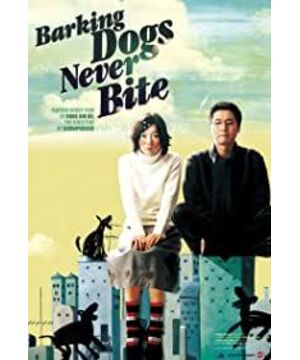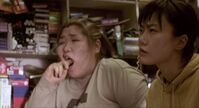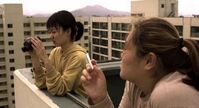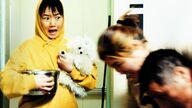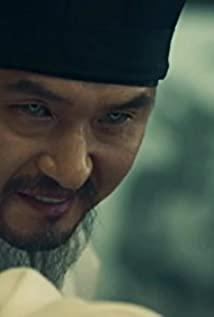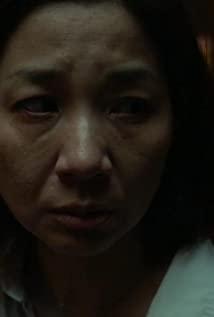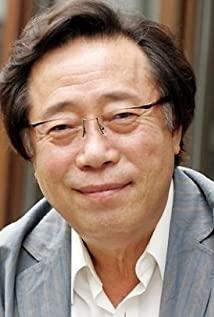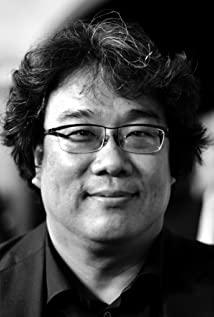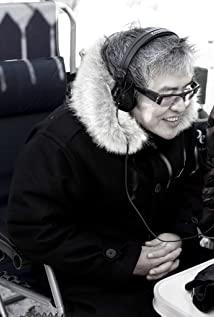"There is no one hundred, fifty at most"
The mantra of Yuan Jun’s wife appeared for the first time when she asked Yuanjun to smash a walnut, and the second time when she asked Yuanjun to buy milk for a dog. Compared with maliciously teasing her husband, this sentence is more like her attitude towards life and self-comfort for herself. When she was pregnant, she faced the double dilemma of job unemployment and her husband needing money to become a professor. She seemed to prefer to blur this kind of suffering. Until this sentence was broken by the husband's more serious behavior, when he went to buy milk for the second time, the husband insisted on measuring the distance to the store with a roll of paper, and bet with her. When measuring one hundred meters, the wife's expression was obviously stunned, including the dog who lost her wife and played with the paper rolls in the convenience store, which showed that she had re-understood her husband's stubbornness and changed part of her attitude towards life. It played a very good role in the transformation of the character's character.
Repeated accent colors
The bright yellow has to be said to be repeated in the film. 1. The little girl who lost the first dog wore a heavy yellow raincoat, and the whole person became the focus of the picture. The yellow here is to reflect the sorrow in the girl's heart, and the other is to emphasize the girl's identity as a child, which forms a contrast with the second mother-in-law who lost her dog and draws our attention to it. 2. Every time Qian Nan chases a dog killer, he wears a yellow sweater and fastens the rope. The yellow here more symbolizes Qian Nan's heroic dream, and the yellow sweater also reflects her bravery. 3. When the dog lost the sticker, Yuan Jun put on a thin layer of plastic yellow raincoat. Unlike the heavy raincoat for the little girl, this thin layer of raincoat shows to a certain extent that Yuanjun is in despair. The expectation for life ignited by the wife's heart is very shallow, but there is still.
The two colors of red and blue have appeared twice in Qiannan's lens. One is Qiannan's umbrella, which is lined with red and blue intervals. The second is the red and blue stickers on the wall when the thousand men ate with their friends. They all indicate the duality of Qiannan’s character. She is kind and brave, but she also has the selfishness that most people in this country have. She wants to see her style on TV, possessing the so-called heroism, and doing A heroic dream.
The end of dogs and people
Analyze separately from the dog killer and the dog owner.
Suffering is borne by people of a lower class. There are three people who kill dogs in po, Yuan Jun, uncle security guard, and homeless people. The three have different motives for killing dogs. Yuan Jun is a middle-class man. He was unsuccessful in killing the dog because of his professorship. The barking upset him. The first dog was locked in the dark basement, and the second dog The roof was thrown down. This may also represent a breakthrough in his state of mind. Although he killed two dogs, he was forgiven in the end. The uncle security guard is a lower class. Killing or eating dead dogs is to improve their lives. Although he was discovered by Yuan Jun, he was still not punished. The homeless man was the lowest class. He killed the dog to fill his stomach, but he was caught the first time he caught the dog and was punished. The motives of the three are different, and the film also increases the authenticity of the construction from these three different aspects.
There are also three dog owners, a little girl, a mother-in-law, and Yuanjun's wife. Speaking of a girl since she was little, she was still young and not well involved in the world. Never experienced the misery of life. She said that if she couldn't find a dog, she would go on a hunger strike and commit suicide. We all know this is just a kid's joke. Sure enough, the little girl got a new white dog. Speaking of mother-in-law, a mother-in-law who lives with a dog, named her sweetheart and loves life. After discovering that her dog had left, she also quietly walked away on the hospital bed. We don’t know if she has any relatives. But "sweetheart" meant to her obviously more than just a dog. Finally speaking of Yuanjun's wife, this dog was bought by her with her pension. It is her farewell to the past and her sustenance of hope. She didn't know that Yuanjun hated dogs, she knew, because when Yuanjun was reluctant to throw the dog away, her first reaction was to ask if Yuanjun lost the dog deliberately. Although she knew that her husband hated dogs, she still bought the dog. She lived for herself once, which is different from asking her husband to smash walnuts in the past. This dog is proof that she lived for herself.
"When it rains, I can't go to the rooftop to smoke."
The composition of the film is also worth thinking about. The tall buildings surround Yuan Jun, and a strong sense of suffocation oppresses him, visualizing his plight. Yuan Jun's home was overcrowded. When Yuan Jun's wife entered the house, she used a camera from the inside out to clamp the character in the wall. When Yuanjun's wife talks with him, they usually use a tilted lens to express an imbalance. Generally, the wife is above Yuanjun and expresses an unequal relationship.
And Qian's boyfriend's home is also crowded, and the tones are so dim, it also places people in the environment to observe.
In the chasing scenes of Qiannan and Yuanjun, the use of long-term and great perspectives to shoot apartment buildings like horizontal grids indicates that both Qiannan and Yuanjun are in such an environment and it is impossible to escape.
On the rooftop that appeared many times in the film, Qian Nan and his friends were on the rooftop. Using a shot from the top, the characters broke through the shackles of architecture and stood at the highest location. Express the mood of the character. But the rooftop is going to go down after all, after all, it is going to return to the cannibalistic environment.
"No one obeys the rules"
In this film, the rules seem to be broken by people.
Dogs were not allowed in the apartment, but no one followed the rules. The law does not blame the public, and no one cares about this rule if there are more people. When Yuan Jun mentioned this rule, he did not intend to be a defender of the rule, just because the rule is beneficial to him. But when the closest wife also violated the rules, he was helpless instead.
The regulations say that professors are not allowed to pay bribes, but for Yuan Jun, the professor's position has been clearly marked with the price. The original professor was smashed to the head by the train for bribing and drinking. When Yuan Jun went to bribe, the director used the same shooting technique as the previous professor to shoot the scene of Yuan Jun's bribery process. In fact, they are all the same, the same despicable, the same humble. But Yuanjun seemed to be a little more kind after experiencing a series of things. He took a piece of the bribe and gave it to a mother on the subway asking for help. After being drunk, he met Qiannan and he admitted his fault. And was forgiven. This may be the reason why he didn't get his head smashed by the train.
Can't catch up with the train (subway)
The element of train appears multiple times in the film. Qiannan missed the train because he posted a dog-hunting revelation, but her friend left on the train. Qiannan chased after him desperately, but he couldn't catch up. Kind people are incompatible with that society, including many times on the train. In the scene above, the mother carrying her child for help and the sleepy passenger smashed the train head of a professor. The train was like a microcosm of that society, crushing a lot of kindness and hope.
At the end of the film, when Yuanjun confessed to Qiannan, a group of people in white clothes ran past them. Yuanjun and Qiannan once caught up with them, but were overtaken. How could they not be like a team of white trains, with the whiteness of God, with the eyes of this social deformity, judging them. On the other hand, the white "train" passing through them also symbolizes the sublimation of the characters. Self breakthrough.
Bong Joon-ho's films are good at echoing the end, whether it's memories of murder, parasites, or monsters on the Han River. The green scenery, which was exactly the same as the beginning, was slowly drawn up by the curtains, like a curtain fell, and a farce finally came to an end. The look on Yuanjun's face in the dark was not clear. He finally got his wish and became a professor. Whether he will take bribes from the next class and whether he can get the life of his dreams, we don't know. Only Yuan Jun's unidentified face is left to us, the misty future like the day when he lost Qianjia, and the ten thousand yuan lottery ticket that seemed to be teased by fate.
In the end, Qiannan and his friends walked in the green jungle. The endless green scenery overwhelmed us and brought a little hope for the future. This may be the end of Bong Junhao's rare kindness.
View more about Barking Dogs Never Bite reviews


